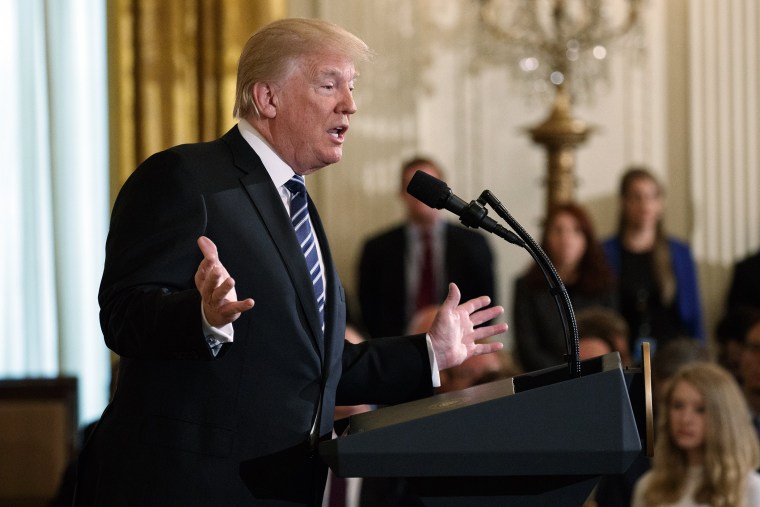Fairly early on Friday morning, Donald Trump raised the prospect of a Justice Department "spy" infiltrating his 2016 campaign. The president, whose affection for odd conspiracy theories is endless, went on to allege the FBI had "at least one" representative "implanted" in his political operation, "for political purposes."
Over the weekend, siding with congressional Republicans over his own administration, Trump added, "If the FBI or DOJ was infiltrating a campaign for the benefit of another campaign, that is a really big deal."
Well, sure, but anyone can make any outlandish claim and say, "If this is true, it's a really big deal." What matters for those who take reality seriously is whether the claim is, in fact, accurate. And in this case, what the president alleged apparently didn't happen. As Rachel noted on the show on Friday, the New York Times had a good report on what actually transpired.
In fact, F.B.I. agents sent an informant to talk to two campaign advisers only after they received evidence that the pair had suspicious contacts linked to Russia during the campaign. The informant, an American academic who teaches in Britain, made contact late that summer with one campaign adviser, George Papadopoulos, according to people familiar with the matter. He also met repeatedly in the ensuing months with the other aide, Carter Page, who was also under F.B.I. scrutiny for his ties to Russia.
The Washington Post had a related report, noting that the FBI made use of "a longtime U.S. intelligence source" because of the bureau's concerns about Russian interference in the American election.
The article added, "There is no evidence to suggest someone was planted with the campaign." Similarly, the Times' report noted, "No evidence has emerged that the informant acted improperly when the F.B.I. asked for help in gathering information on the former campaign advisers, or that agents veered from the F.B.I.'s investigative guidelines and began a politically motivated inquiry, which would be illegal."
What we appear to be looking at is a story in which federal law enforcement was concerned about Trump campaign officials' communications with Russian operatives, and the legal methods the FBI relied on as part of the investigation.
Or put another way, what the president claimed simply wasn't true.
He publicly raised the prospect of federal law enforcement officials embedding a spy on his campaign team, and the available evidence suggests Trump's imagined scenario is ridiculous. If anything, the latest details don't make the Justice Department of the FBI look bad; they make Trump World look worse by reminding the public of campaign officials' suspicious behavior.
But stepping back to put this in a larger context, what we're left with is the president who cried wolf. His "spy" allegations have unraveled. Trump's claims that Barack Obama wiretapped Trump Tower were absurd. His claims that his predecessor intervened in the FBI's Hillary Clinton probe was completely discredited. The president's conspiracy theory about Sen. Mark Warner (D-Va.) in February fell apart almost instantly. His insistence that Uranium One would be the new Watergate quickly became the punch-line to a sad joke.
And those are just some of the recent conspiracy theories that Trump has thrown around in desperation, panicked by Special Counsel Robert Mueller's investigation. This is, after all, the man who rose to prominence in Republican politics because of a racist conspiracy that never made any sense.
Over the summer, the president declared, "When I make a statement, I like to be correct. I want the facts… Before I make a statement, I need the facts." White House Press Secretary Sarah Huckabee Sanders later added that Trump "believes in making sure that information is accurate before pushing it out as fact."
Reading quotes like those, it's hard to know whether to laugh or cry, but the point is, anyone who believes Trump's claims, or accepts them at face value, is only fooling themselves. How many more times does the president have to peddle nonsensical theories before everyone's first instinct is to question his trustworthiness?
